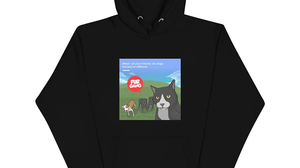The Ethics of Animal Clothing
Posted By james arness
Body
The ethics of animal clothing refers to the moral considerations surrounding the use of animal products, such as fur, leather, and wool, in clothing and fashion. Some argue that it is unethical to use animal products in clothing because it involves exploiting and killing animals for human purposes. Others counter that the use of animal products in clothing can be ethical if it is done humanely and with respect for the animals involved. The debate over the ethics of animal clothing is complex and multifaceted and ultimately depends on one's personal values and beliefs.
Is it Ethical to Dress Animals in Clothing?
As humans, we have a long history of using clothing to protect ourselves from the elements and to express our personal style. But what about animals? While it may seem cute or amusing to dress our pets in clothing, the ethics of animal clothing are a complex and controversial topic.
On one hand, there are some situations where clothing can be beneficial for animals. For example, working animals such as police dogs or service dogs may wear protective gear to keep them safe in their line of duty. Cold weather gear can also be necessary for pets living in colder climates to keep them warm and comfortable. In these cases, the use of clothing is practical and serves a clear purpose.
However, there are also many cases where the use of animal clothing is more questionable. Some people dress their pets in clothing for their own entertainment or as a form of fashion accessory. In these situations, the animal is being used for the benefit or enjoyment of the owner, rather than for any practical purpose. This raises concerns about the well-being and autonomy of the animal, as they may be forced to wear clothing that is uncomfortable or restricts their movement.
Another concern is the potential for animal clothing to lead to the objectification of animals. When we dress animals in clothing, we are imposing our own human values and ideas of what is "cute" or "fashionable" on them. This can contribute to the idea that animals are merely objects or accessories, rather than sentient beings with their own needs and desires.
Alternatives to Animal Clothing
If you are looking for ways to keep your pet warm or protected, there are many alternatives to traditional clothing that may be more ethical and practical. For example, you can use blankets or pet-safe heated pads to keep your pet warm, rather than dressing them in clothes. There are also many types of protective gear available for working animals that do not restrict movement or cause discomfort.
Additionally, there are many ways to show your love and affection for your pet without resorting to dressing them in clothing. Providing them with proper nutrition, exercise, and medical care is a much more meaningful way to show your commitment to their well-being. You can also spend quality time with your pet, play games with them, and give them plenty of love and attention.
Conclusion
the ethics of animal clothing are complex and multifaceted. While there are some situations where clothing can be necessary or beneficial for animals, it is important to consider the well-being and autonomy of the animal before dressing them in clothing. There are also many alternatives available that can provide the same benefits without objectifying or restricting animals. As animal lovers, it is our responsibility to ensure that the animals in our care are treated with respect and consideration.







Comments